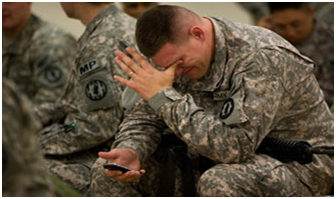At least one in five military veterans in the United States who have experienced trauma are at greatly elevated risk for depression, suicide, or substance abuse even though they do not meet all criteria for post-traumatic stress disorder.
The findings highlight the scope and burden of “sub-threshold PTSD,” a collection of symptoms that aren’t complete enough or severe enough to earn a diagnosis.
“You have a very large group of people who may be in need of treatment, but are often overlooked in clinical settings,” says Robert Pietrzak, a clinical psychologist at Yale University.
PTSD is a debilitating condition marked by intrusive memories of a traumatic event. It is also marked by a pattern of avoiding things or people that conjure up those memories, an increase in negative thoughts and feelings, and symptoms of hyper-arousal—such as increased anger, trouble concentrating or sleeping, and being easily startled.
All symptoms must be present, be of certain severity and duration, and cause clinically significant functional impairment before the condition is diagnosed. Although not recognized as a formal psychiatric diagnosis, sub-threshold PTSD is an overlooked trigger of a variety of mental health problems.
Researchers suspected that a much larger group of veterans who experience moderate levels of PTSD symptoms are at greater risk for other psychiatric disorders.
The study of 1,484 veterans, to be published in World Psychiatry, shows that 8 percent were diagnosed with PTSD but 22.1 percent met criteria for sub-threshold PTSD during their lives. Further, in addition to 4.5 percent of veterans diagnosed within the last month, 13.1 percent experienced sub-threshold symptoms. Those who did had substantially higher rates of co-occurring psychiatric problems.
For instance, those with sub-threshold PTSD had a 20.1 percent chance of suffering major depression in their lifetimes, compared to just 4.4 percent of veterans without those symptoms. Nearly four times as many reported suicidal thoughts than veterans without sub-threshold PTSD (12.2 percent vs. 3.4 percent). These rates were even more elevated among veterans diagnosed with PTSD.
“The results were striking,” Pietrzak says. “We found three, four, five times higher rates of some disorders in veterans with sub-threshold PTSD.”
Clinicians should be vigilant in assessing, monitoring, and possibly treating sub-threshold PTSD symptoms in those who have experienced any form of trauma, whether it be related to combat or the sudden unexpected loss of a loved one.
Natalie Mota, a former postdoctoral researcher in Pietrzak’s lab, is the study’s lead author.
Source: Yale University





